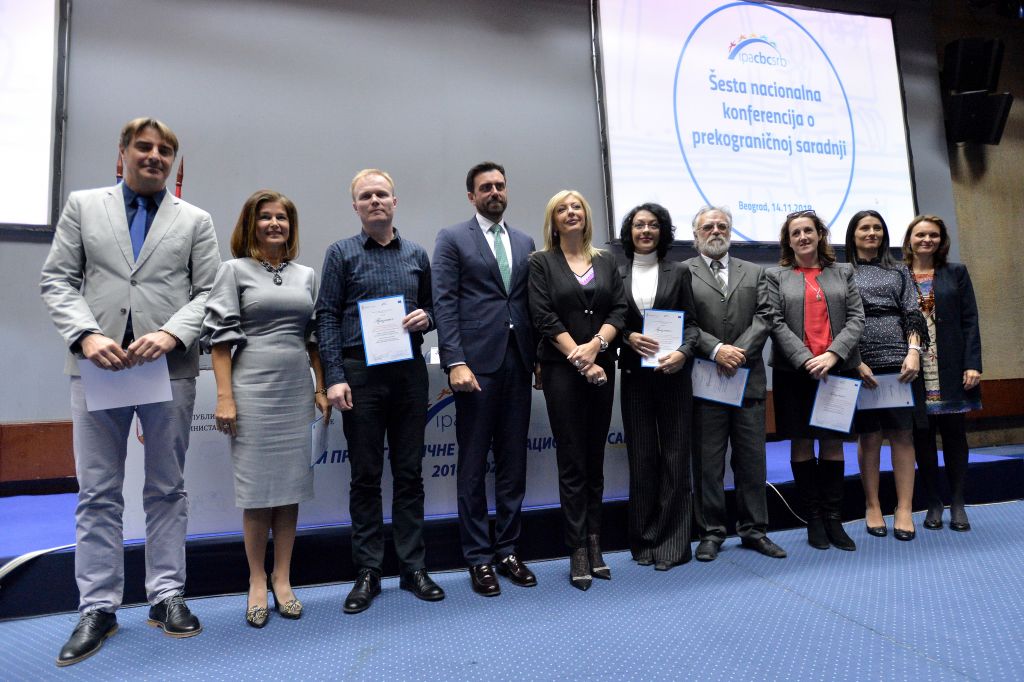
The goal of the Government of Serbia is to maximize the absorption of financial means from EU funds, since their use directly contributes to the quality of citizen’s lives and the development of the entire country, Minister of European Integration Jadranka Joksimović has stated today, adding that the authorities are consequentially opening doors and perspectives for local self-governments to access funds, which are namely grants.
“It is easiest to ask for money from the budget. There will never be enough money in the budget, so that is why we will not and must not miss the opportunity to obtain financial means from EU funds, not because it is free, but because it directly means development of the country, the region, local self-government, contribution to employment, improvement of the quality of life”, said Joksimović at the Sixth National Conference on Cross-Border Cooperation, where the best projects in the field of cultural heritage preservation were awarded.
Joksimović recalled that, as a candidate, Serbia had seven ongoing cross-border cooperation programmes aimed at strengthening confidence, solidarity, reducing inequality etc.
“As a minister and the National IPA Co-ordinator, I strive to open perspectives and doors to local self-governments to access funds, above all non-refundable, i.e. grants, not loans, and inform them of the sums and projects these funds can be allocated for”, said the Minister.
She recalled that the visibility of pre-accession funds before her arrival at the head of the Ministry was below 10 percent, which, in her opinion, was devastating in respect of the country’s development, while today it amounts to between 45 and 55 percent.
“I would consider myself to be an extremely unsuccessful Minister if I had failed in four years to raise visibility and comprehension among citizens that the European path does not only represent abstract things, but also development of local roads, infrastructure, cultural and cross-border cooperation, tourism, and so-forth, which improves the quality of life of citizens on a daily basis”, noted the Minister.
She recalled that, among other things, a malignancy prevention hospital in Požarevac was being upgraded within the framework of a cross-border cooperation project with Romania.
As a result of these projects, she said, the synagogue in Subotica, the second largest in Europe after the one in Budapest, was reconstructed, as was the Golubac Fortress, while citizens have been provided with new health centres, schools, and sewerage and water supply networks.
The minister added that the cohesion policy that Serbia must prepare for was a policy intended for reducing differences and balancing the growth rate and development of all members.
She stated that the Government's objective was to enter the EU cohesion policy prepared and not to be unprepared to use billions of EUR that will be available to it, as they were available to some of the neighbouring countries that became members but whose percentage of utilisation was absolutely and inadmissibly low.
“This would cause damage to citizens, so responsible governments and local self-governments must enter this process seriously and with full capacity, because without that everything remains idle talk. All that is not withdrawn is wasted money and nobody has the right to do that”, she said, adding that what the Government was doing was not only for Brussels and the use of funds, but also for every citizen.
“The story of European integration is a story of peace, stability, good neighbourly relations, use of funds, joint development, sustainable regional development, reduction of inequality - both social and economic, because without that every rhetoric loses meaning”, stressed the minister, estimating that Serbia would have to work more on a stable and sustainable path towards the EU, which would result in membership in five to seven years and subsequently be followed by a new development phase.
Following the presentation of the representative of the European Commission's Directorate-General for Regional and Urban Policy, Simona Pohlová, on the need to establish a fund for further assisting local self-governments and regional development agencies, Minister Joksimović said that she hoped the Ministry of Finance and the Development Agency of Serbia will increase the allocations to local self-governments for pre-financing and co-financing projects in order to make them even more prepared to participate in cross-border cooperation projects. Joksimović explained that sometimes local self-government units do not have enough funds at their disposal to participate in co-financing cross-border cooperation projects, but in this way they would be able to participate in such projects, where a part of the assets would be refunded from EU funds.
Source: Tanjug
















